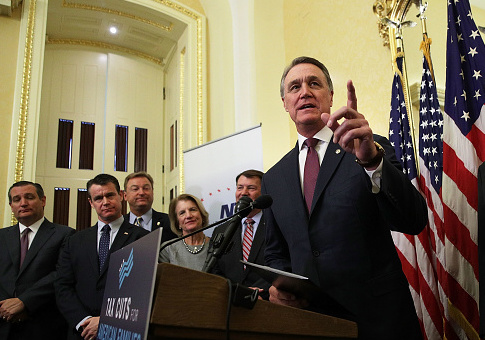Sen. David Perdue (R., Ga.) made clear on Thursday that Senate Republicans see ending the practice of "chain migration" as a major priority for any immigration reform, potentially requiring its end and other policies in exchange for an amnesty for DACA recipients.
"I think the mood, in our caucus anyway, is that ending chain migration is a top priority. The majority leader of the Republican caucus says that he is in favor of eliminating chain migration. I think that's a milestone," Perdue said at a panel on immigration hosted by the National Press Club.
Chain migration is the process by which immigrants are allowed to sponsor members of their immediate and extended family to come to the United States, once certain preconditions are met.
It is removed from U.S. immigration rules in the Reforming American Immigration for Strong Employment (RAISE) Act, of which Perdue is a sponsor. Cosponsored by Sen. Tom Cotton (R., Ark.), the bill would cut total immigration levels by 50 percent.
That cut, Perdue and others contend, would help offset the effects of a possible amnesty for beneficiaries of the Deferred Action for Childhood Arrivals (DACA) program, an Obama-administration initiative that granted legal protections to certain immigrants who arrived illegally in the United States while they were still minors.
President Donald Trump ended the program in September, explicitly passing the responsibility to Congress to address the status of the 700,000 immigrants DACA covers.
Senate Majority Leader Mitch McConnell (R., Ky.) told Fox News host Laura Ingraham Wednesday night that he supports the RAISE Act, and backed ending chain migration as part of any future DACA amnesty.
"I agree with Cotton and Perdue. The president has given us until March to deal with the issue of DACA, and the question is whether you're just going to do that and nothing else. I'm in favor of doing something on the DACA front—these kids came here through no act of their own, I think they have a legitimate case to be made—but I don't think we ought to just do that. Chain migration, doing something about the diversity lottery, there are plenty of changes to the legal immigration system that should be added to any kind of a DACA fix that we do," McConnell said.
Any fix for DACA, Republicans contend, would need to go hand-in-hand with reform to America's immigration system, which Perdue said has not been substantially overhauled since 1990. Many like Perdue worry that a blanket amnesty for DACA recipients and their parents—some 2 million people in all—would be destabilizing to the country in the absence of reforms to ensure the economic security of American workers.
"DACA is going to have certain harmful consequences. It's going to almost certainly attract more illegal immigrants and … spark more chain migration. So something like the RAISE Act is necessary as a kind of damage control component of a DACA fix rather than just horse trading, we'll pick one from column A, one from column B," said Mark Krikorian, executive director of the Center for Immigration Studies (CIS), who moderated the panel at the National Press Club.
The CIS estimates that each new immigrant brings an average of 3.45 additional relatives to the United States; about 61 percent of immigrants to the United States between 1981 and 2016 arrived via chain migration.
Perdue also made clear his opposition to the diversity visa lottery, a program which allocates visas to applicants "from countries with historically low rates of immigration to the United States."
"Even CIS has called out that, for example, we give Iran the third most green cards of any country that we give in the green card visa lottery. Iran, the third most," Perdue said. "And thirty percent of all visas given out in the diversity visa lottery program are given to countries that have been identified by ICE as being sources of terrorists."
"So this is a major national security issue, and we take it out, we eliminate it in our proposal," he said.
The diversity visa lottery attracted fierce criticism, including from President Trump, after a visa lottery recipient killed eight in a truck attack in New York in October.
